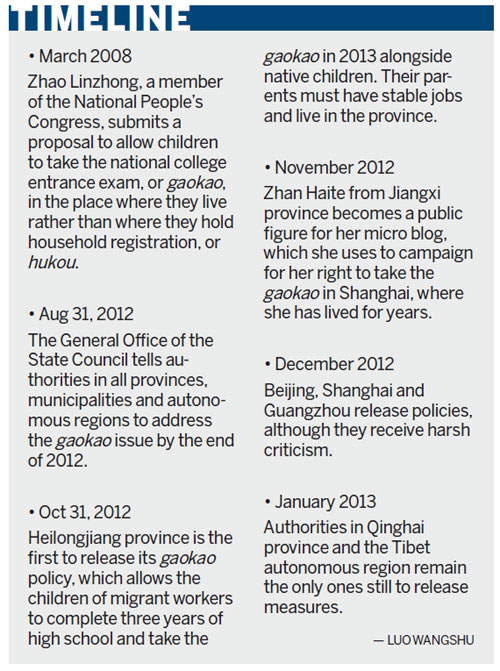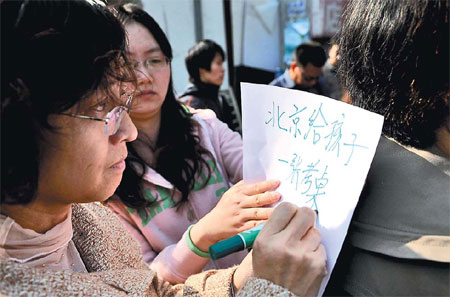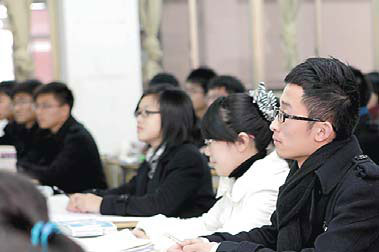Moves to change gaokao rules spark heated debate
Updated: 2013-01-24 07:20
By Luo Wangshu and Jin Zhu (China Daily)
|
||||||||

|
A mother asks for her child to have the right to take the national college entrance examination in Beijing. Parents of migrant children without Beijing hukou gather at the gate of the capital's education commission to check for updates of the gaokao rules. Provided to China Daily |
|
Anhui native Liu Peng (right) takes notes in class in a private high school in Zhejiang province. He no longer needs to spend extra time studying textbooks used in his hometown after the province's new gaokao rules allow students without local hukou to attend the entrance exam in Zhejiang. Luo Shanxin / for China Daily |
Attempts to improve educational equality a sensitive, emotive issue
China needs more time to change the rules on where children can go to senior high school and take the national college entrance exam, academics say.
"Especially in large, developed cities and regions, the restrictions on children of migrant workers can't be relaxed in the short term unless authorities can solve the conflict between gigantic migrant populations and a scarcity of education resources," said Li Chang'an, a public policy professor at the University of International Business and Economics in Beijing.
Tan Songhua, who sits on the National Education Advisory Committee and is a key architect of the exam, known as the gaokao, agreed it will take time to strike a balance.
"Looking at the larger picture, the gaokao problem is not only about education but also public management," he said.
The opinions come after most provinces, municipalities and autonomous regions released detailed plans to reform gaokao rules for the children of migrant workers by the end of December.
Only Qinghai province and the Tibet autonomous region have not yet published their measures.
Those released by Beijing, Shanghai and Guangdong province were widely criticized as too strict.
Migrant children in Beijing still cannot take the entrance exam in 2013 and 2014 under the new gaokao rules. They are only allowed to attend secondary vocational schools from 2013 and higher vocational schools from 2014. After graduating from higher vocational schools, they can apply for universities.
Shanghai said it will allow nonresident children to enter senior high schools, vocational schools and take college entrance exams in 2014.
In Guangdong, such groups of children can be enrolled at senior high schools from this year and will be allowed to take the exams and compete with native residents on equal footing in 2016.
Migrant workers, whose children benefit by the new plans in the three regions, must meet requirements including having residential permits, and stable jobs and incomes, according to the plans.
"I feel very disappointed about the policy in Beijing. It is more than discrimination," said Shao Lingling, mother of a 13-year-old boy, from Henan province.
Her son was born in Henan and came to Beijng with his parents in 2005. He attended kindergarten and primary school in Beijing, and is now in seventh grade at middle school.
"Some populous provinces, such as Henan and Sichuan, welcome children of migrants with open arms. But Beijing, Shanghai and Guangzhou still offer no solution," she added.
People who are against allowing children of migrant workers to take the entrance exam with local children argue that it will cause more people to flood into the big cities, while metropolises such as Beijing and Shanghai are already overloaded and cannot handle more newcomers.
Sun Xiaobing, director of policy and regulation at the Ministry of Education, said on Jan 17 that Beijing's policy is a transitional one, and will improve step by step.
A 43-year-old father living in Shanghai, who gave his name only as Zhou for fear of reprisals from fellow residents, said he is far more anxious.
His 14-year-old son is in the eighth grade and will face the high school entrance exam in 2014.
"We're desperate. The new policy looks at parents' backgrounds, instead of children's ability. It is so unfair," said the native of Anhui province.
"We came to a better place, seeking a better life, but this migrant tag not only sticks with us, but also with our children.
"Children's education problems are a burden to our families," said the father.
"Sometimes we enjoy our family time, but once the idea of school problems pops up, the delightful atmosphere is gone without trace and we feel doomed."
China's hukou system, or household registration system, restricts children to attending schools in their home provinces. A regulation amended the restriction in 2003 by allowing children of migrants to receive nine-year compulsory education in cities where their parents work.
But under such policies, migrant children had to either return to their home provinces for further schooling or risk dropping out of school if they chose to stay with their parents in the cities where they work.
The policies have sparked mounting protests in recent years. As a consequence, the new gaokao rules were issued in 2012 as a major effort by the central government to provide equal rights in education and matriculation opportunities for those children, a group that is increasing due to the country's rapid urbanization.
Local requirements - loose or strict - mostly depend on a city's migrant population and the competitiveness of students, policy professor Li Chang'an said.
He believes that in less developed areas, such as Qinghai and Tibet, officials are still considering how to avoid opening the gaokao to migrants.
"If migrant children are allowed to take the gaokao in those regions, most of them could take opportunities away from local students to attend better universities because they have received better education in developed areas," he said.
Also, the rather harsh requirements in Beijing are a way to protect native students, said a teacher at a senior high school in the capital who asked to be identified as Yang.
She was referring to the fact that students who take the exam in Beijing can qualify for the city's colleges with lower scores than if they took it in other provinces.
"Nearly 70 percent of the students in our school have to go to vocational schools for further study every year," she said. "The city's new policy for migrant children will surely give those local students fewer choices in the future."
Analysts say such conflicts are triggered by an uneven distribution of education resources, which cannot be solved by the new gaokao rules.
As part of State policy to solve the education equity problem, Tan Songhua said the less-developed areas, with fewer education resources, will receive more benefits, such as more slots for students entering prestigious universities.
The recruitment plan already leans toward central and western areas, giving more opportunities to students there.
Last year, universities included in Project 211 distributed 10,000 recruitment opportunities to high poverty counties.
Project 211 involves about 100 universities that receive extra investment and attention from the State as they are considered good universities.
"Another effective way to tackle the gaokao problem is to give more supportive policies to upgrade education resources in less developed regions, such as build more top-class schools," Li Chang'an said.
"If there were top universities like Peking University and Tsinghua University in western regions, would migrant students still rush to Beijing?" he said.
Contact the writers at luowangshu@chinadaily.com.cn and jinzhu@chinadaily.com.cn

(China Daily 01/24/2013 page7)

 In Photos: 7.0-magnitude quake hits Sichuan
In Photos: 7.0-magnitude quake hits Sichuan
 Li Na on Time cover, makes influential 100 list
Li Na on Time cover, makes influential 100 list
 FBI releases photos of 2 Boston bombings suspects
FBI releases photos of 2 Boston bombings suspects
 World's wackiest hairstyles
World's wackiest hairstyles
 Sandstorms strike Northwest China
Sandstorms strike Northwest China
 Never-seen photos of Madonna on display
Never-seen photos of Madonna on display
 H7N9 outbreak linked to waterfowl migration
H7N9 outbreak linked to waterfowl migration
 Dozens feared dead in Texas plant blast
Dozens feared dead in Texas plant blast
Most Viewed
Editor's Picks

|

|

|

|

|

|
Today's Top News
Live report: 7.0-magnitude quake hits Sichuan, heavy casualties feared
Boston suspect cornered on boat
Cross-talk artist helps to spread the word
'Green' awareness levels drop in Beijing
Palace Museum spruces up
First couple on Time's list of most influential
H7N9 flu transmission studied
Trading channels 'need to broaden'
US Weekly

|

|









